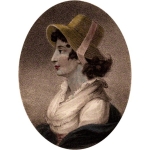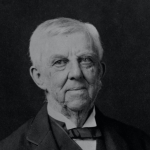The Muses are turned gossips; they have lost
The buskined step, and clear high-sounding phrase,
Language of gods. Come, then, domestic Muse,
In slip-shod measure loosely prattling on,
Of farm or orchard, pleasant curds and cream,
Or droning flies, or shoes lost in the mire
By little whimpering boy, with rueful face —
Come, Muse, and sing the dreaded washing day.
Ye who beneath the yoke of wedlock bend,
With bowed soul, full well ye ken the day
Which week, smooth sliding after week, brings on
Too soon; for to that day nor peace belongs,
Nor comfort; ere the first grey streak of dawn,
The red-armed washers come and chase repose.
Nor pleasant smile, nor quaint device of mirth,
Ere visited that day; the very cat,
From the wet kitchen scared, and reeking hearth,
Visits the parlour, an unwonted guest.
The silent breakfast meal is soon despatched,
Uninterrupted, save by anxious looks
Cast at the louring, if sky should lour.
From that last evil, oh preserve us, heavens!
For should the skies pour down, adieu to all
Remains of quiet; then expect to hear
Of sad disasters — dirt and gravel stains
Hard to efface, and loaded lines at once
Snapped short, and linen-horse by dog thrown down,
And all the petty miseries of life.
Saints have been calm while stretched upon the rack,
And Montezuma smiled on burning coals;
But never yet did housewife notable
Greet with a smile a rainy washing day.
But grant the welkin fair, require not thou
Who callest thyself, perchance, the master there,
Or study swept, or nicely dusted coat,
Or usual ’tendence; ask not, indiscreet,
Thy stockings mended, though the yawning rents
Gape wide as Erebus; nor hope to find
Some snug recess impervious. Shouldst thou try
The ’customed garden walks, thine eye shall rue
The budding fragrance of thy tender shrubs,
Myrtle or rose, all crushed beneath the weight
Of coarse-checked apron, with impatient hand
Twitched off when showers impend; or crossing lines
Shall mar thy musings, as the wet cold sheet
Flaps in thy face abrupt. Woe to the friend
Whose evil stars have urged him forth to claim
On such a dav the hospitable rites;
Looks blank at best, and stinted courtesy
Shall he receive; vainly he feeds his hopes
With dinner of roast chicken, savoury pie,
Or tart or pudding; pudding he nor tart
That day shall eat; nor, though the husband try —
Mending what can’t be helped — to kindle mirth
From cheer deficient, shall his consort’s brow
Clear up propitious; the unlucky guest
In silence dines, and early slinks away.
I well remember, when a child, the awe
This day struck into me; for then the maids,
I scarce knew why, looked cross, and drove me from them;
Nor soft caress could I obtain, nor hope
Usual indulgencies; jelly or creams,
Relic of costly suppers, and set by
For me their petted one; or buttered toast,
When butter was forbid; or thrilling tale
Of ghost, or witch, or murder. So I went
And sheltered me beside the parlour fire;
There my dear grandmother, eldest of forms,
Tended the little ones, and watched from harm;
Anxiously fond, though oft her spectacles
With elfin cunning hid, and oft the pins
Drawn from her ravelled stocking, might have soured
One less indulgent.
At intervals my mother’s voice was heard,
Urging dispatch; briskly the work went on,
All hands employed to wash, to rinse, to wring,
Or fold, and starch, and clap, and iron, and plait.
Then would I sit me down, and ponder much
Why washings were; sometimes through hollow hole
Of pipe amused we blew, and sent aloft
The floating bubbles; little dreaming then
To see, Montgolfier, thy silken ball
Ride buoyant through the clouds, so near approach
The sports of children and the toils of men.
Earth, air, and sky, and ocean hath its bubbles,
And verse is one of them — this most of all.



















Comment form: